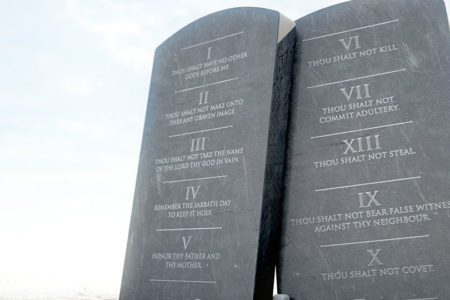Vessels of Clay Romans 9:1–29
A look at election and the sovereignty of God
Four thousand years ago, God called Abraham from Ur of the Chaldees (southern Iraq) to the land of Canaan (Israel) and made him an awesome promise: “I will make you a great nation; I will bless you and make your name great; and you shall be a blessing. I will bless those who bless you, and I will curse him who curses you; and in you all the families of the earth shall be blessed” (Gen. 12:2–3).
During the reigns of Kings David and Solomon, the promise seemed to reach its zenith. Then the nation spiraled downward and was in subjection to Rome when Jesus, its promised Messiah, appeared.
Yet, rather than ushering in the glorious Kingdom God had promised through the prophets, Jesus was crucified. Early on, many Jewish people accepted Him (Jewish men wrote all but two New Testament books), but the nation’s leaders overwhelmingly rejected Him. Though the gospel went to the Jewish people first, slowly it turned to the Gentiles, creating something entirely new: the church, composed of Jews and Gentiles.
So what happened to Israel? Were the Israelites not God’s Chosen People? Why were they being left behind? These are the questions the apostle Paul felt compelled to answer when he wrote Romans 9—11.
After elaborating in Romans 8 on God’s commitment to believers and their security in Christ, he began to answer questions sure to be on his readers’ minds: (1) Do you no longer care about Israel? (2) Weren’t all Israelites chosen by God? (3) How can God judge what He decreed?
Paul’s Broken Heart (vv. 1–5)
It may have seemed to some that Paul had turned his back on his own people. Apparently he had been accused of callously abandoning them. But Paul was brokenhearted over Israel. Three times in Romans 9:1 he emphasized his concern and passionately communicated the “great sorrow and continual grief” he felt whenever he thought of his kinsmen (v. 2).
This grief was intensified by his concern that he “could wish” himself to be accursed from Christ for the sake of his brethren (v. 3). “Could wish” is the translation of the Greek imperfect middle verb euchomai (“to pray” or “to wish”). The tense refers to repeated action in the past. A more literal translation might be, “I was wishing [praying] repeatedly for I myself to be accursed [anathema] from Christ for [the sake of, on behalf of] my brothers, my kinsmen according to the flesh.”
Paul’s prayer is reminiscent of Moses’ intercession for Israel in Exodus 32. Fearing God’s catastrophic judgment on the Israelites for the deliberate sin of worshiping the golden calf, Moses pleaded to the Lord for them:
Now it came to pass on the next day that Moses said to the people, “You have committed a great sin. So now I will go up to the Lord; perhaps I can make atonement for your sin.” Then Moses returned to the Lᴏʀᴅ and said, “Oh, these people have committed a great sin, and have made for themselves a god of gold! Yet now, if You will forgive their sin—but if not, I pray, blot me out of Your book which You have written.”
And the Lᴏʀᴅ said to Moses, “Whoever has sinned against Me, I will blot him out of My book. Now therefore, go, lead the people to the place of which I have spoken to you. Behold, My Angel shall go before you. Nevertheless, in the day when I visit for punishment, I will visit punishment upon them for their sin.” So the Lᴏʀᴅ plagued the people because of what they did with the calf which Aaron made (vv. 30–35).
In speaking to Moses, God stated His principle of judgment: “Whoever has sinned against Me, I will blot him out of My book.” God’s judgment was severe because the Israelites’ blessings were many (see Romans 9:4–5). Paul was brokenhearted (much like Moses) over his people’s rejection of Jesus, and he realized they would be judged according to God’s righteousness. Also like Moses, he knew he must go forward with his God-given mission.
God’s Sovereign Choice (vv. 6–18)
In this section, Paul anticipated the objection that God’s Word must have failed because so many Jewish people rejected the gospel of Jesus. Paul’s explanation: Not every physical descendant of Abraham and Isaac is a spiritual descendant. He reasoned that God’s Word has not failed because God’s promise is not the issue; God’s sovereign choice is.
Many people, including great theologians, struggle with the doctrine of election. Indeed, finding the biblical balance between overemphasized divine sovereignty (fatalism) on the one hand and overemphasized freedom (human determinism) on the other is difficult. Clearly, men are responsible for their decisions and actions. Just as clearly, God is sovereign over all of His creation. In verses 6–18, Paul’s twofold explanation of what happened to the Jewish people emphasizes God’s sovereign choice:
(1) Not every descendant of Abraham and his son Isaac is a child of the promise. Only Isaac was the son of the promise. Abraham’s sons by Hagar (his wife’s Egyptian maid) and Keturah (his wife after Sarah died) were excluded. Only children of the promise are Abraham’s spiritual descendants: “Those who are the children of the flesh, these are not the children of God; but the children of the promise are counted as the seed” (v. 8).
Then he added that not even every child of the promise is a child of God; only those who are “chosen” by God are counted as His children. Such election was seen when God selected Jacob while he was still in Rebekah’s womb: “(For the children not yet being born, nor having done any good or evil, that the purpose of God according to election might stand, not of works but of Him who calls), it was said to her, ‘The older shall serve the younger.’ As it is written [in Malachi 1:2], ‘Jacob I have loved [chosen], but Esau I have hated [rejected]’” (Rom. 9:11–13).
It was not God’s promises that failed. All of Abraham’s descendants through Isaac were never included as God’s children. And those who were included were brought in according to God’s sovereign choice. As Paul told the predominantly Gentile church of the Ephesians, “By grace you have been saved through faith, and that not of yourselves; it is the gift of God, not of works, lest anyone should boast” (Eph. 2:8–9).
(2) God has the sovereign right to show mercy or not. Even today, God chooses some Gentiles and Jews to be part of the church, but not others. To some, God shows mercy, while others (like Pharaoh) He hardens: “It is not of him who wills, nor of him who runs, but of God who shows mercy” (Rom. 9:16).
Citing God’s statement that He raised up Pharaoh “that I may show My power in [him], and that My name may be declared in all the earth” (v. 17), Paul concluded, “Therefore He has mercy on whom He wills, and whom He wills He hardens” (v. 18).
There have always been Jewish people, just as there have always been Gentiles, who have rejected God and His revelation. Only those of the promised line, whom God chose according to His sovereign purposes, have been incorporated into God’s family. Every child of God (in every age) should gratefully acknowledge His gracious calling, without which no one would be saved.
God’s Right to Judge (vv. 19–29)
Paul then anticipated that someone might ask, “How can God judge those who have not been chosen [called] according to His sovereign will?” He wrote, “You will say to me then, ‘Why does He still find fault? For who has resisted His will?’” (v. 19).
Paul replied that God, as the Creator, has the authority to do whatever He wishes. The created one has no right to challenge his Creator any more than a clay vessel has the right to challenge the potter who made it. The potter has the prerogative to make from the same lump of clay both a valuable vessel and a common one.
Similarly, though God may want “to show His wrath and to make His power known,” He might choose to endure “with much longsuffering the vessels of wrath prepared for destruction” (v. 22) so that “He might make known the riches of His glory on the vessels of mercy, which He had prepared beforehand for glory, even us whom He called, not of the Jews only, but also of the Gentiles” (vv. 23–24). God’s plan to manifest His glory extended far beyond what His people understood up to that time.
God has the right to do what He wants because He is God. Paul reasoned that God’s purpose was to endure the nonchosen, physical descendants of Abraham and Isaac as vessels of wrath, while choosing some of them as His children for His glory. All the while, He had a plan to call other vessels of mercy for His glory from among both Jews and Gentiles (but predominantly Gentiles) and form them into an entirely new entity called the church. Previously, this plan had not been revealed (see Ephesians 3:8–11).
Paul’s answer may have surprised his readers, many of whom probably thought of the Gentiles as vessels of wrath and the Jews as vessels of mercy. He said that God endured a significant number of Jewish people as vessels of wrath while He was preparing to call many Gentiles as vessels of mercy, and he cited Hosea’s prediction that God would “call them My people, who were not My people, and her beloved, who was not beloved. And it shall come to pass in the place where it was said to them, ‘You are not My people,’ there they shall be called sons of the living God” (Rom. 9:25–26). Paul then quoted Isaiah to show that only a remnant of Israel will be preserved by God.
He then referred to Isaiah 10:22–23: “Isaiah also cries out concerning Israel: ‘Though the number of the children of Israel be as the sand of the sea, the remnant will be saved’” (Rom. 9:27).
So, What Happened to Israel?
God is holy and must deal with sin. However, in His mercy, He calls people from among both Jews and Gentiles for His glory.
Paul’s defense underscores the security of church saints in their relationship with Jesus. What God has promised, He will do. Members of the body of Christ may rest assured in God’s election and sovereignty.
Yet the promises God made to Israel (land, seed, and blessing—spiritual and otherwise) still belong to Israel because they are eternal in nature. The fact that God had a plan all along to make millions of Gentiles vessels of mercy in no way invalidates His plan and promises for Israel.
A time is coming—the seven-year Tribulation, which the prophet Jeremiah called “the time of Jacob’s trouble” (Jer. 30:7)—when God will again predominantly choose the descendants of Jacob and usher in the glorious Kingdom of Messiah Jesus, to the praise of the glory of His grace.







